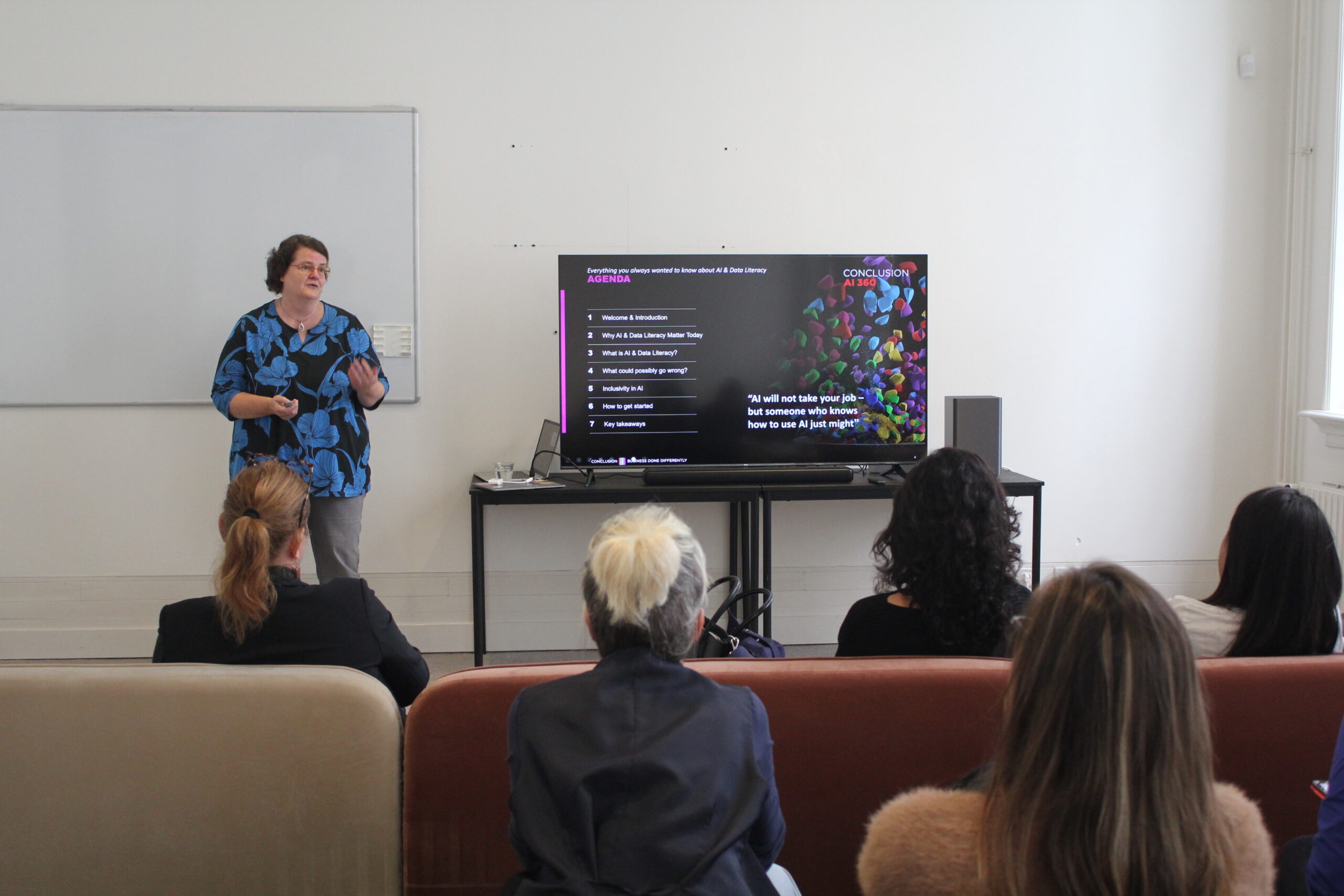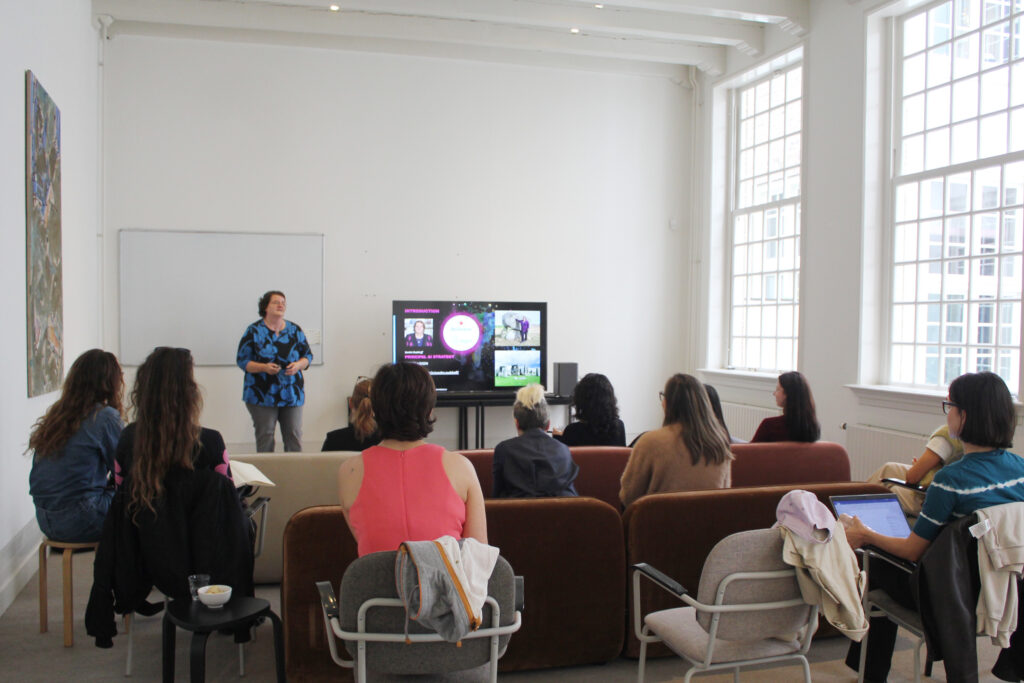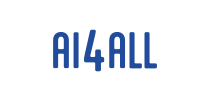AI and Data Literacy: Building Critical Skills for the Future
AI4All Amsterdam Circle event on September 11, brought together a lively group of women to explore a timely and pressing theme: AI and Data Literacy. The session featured Sandra Oudshoff, Principal Responsible AI Strategy Consultant at Conclusion AI360, who led the conversation on why these skills are becoming indispensable.
Written by: Berna Syuleymanoglu.

With more than 35 years of experience in data and AI, Sandra sparked an engaging mix of insights, debates, and reflections on how we can all learn to live and work with AI critically and responsibly.
Why AI Matters Today?
Opening her talk, Sandra offered a lens on AI’s rapid evolution. While AI has roots going back decades, only recently has it begun to shape nearly every corner of business and society, and at an incredible pace. As Sandra explained:
“Everywhere in the business you can apply AI and derive value from it”
But enthusiasm for AI often outpaces understanding. In Sandra’s words, “everybody wants AI”, yet the real challenge lies in equipping people with the knowledge to use it responsibly. She argued that companies must invest in training their employees so AI can be applied well, safely, and effectively.
Sandra captured this challenge in a line that drew nods across the room:
“AI will not take your job, but someone who knows how to use AI just might.”
This wasn’t a warning; it was a call to action. The future belongs to those willing to learn how to work with AI, not against it.
A compelling case came from Coca-Cola’s supply chain program, where 60,000 hours of targeted data literacy training led to 10–20% productivity gains, translating into millions in added value. It was a clear demonstration that literacy programs deliver not only knowledge but also measurable ROI.
Data Literacy: From Numbers to Insights
Sandra’s first focus was data literacy, which she defined as the ability to read, work with, analyse, and argue with data. She stressed that this doesn’t mean being a “math wizard.” Instead, it’s about learning to ask the right questions and to challenge the assumptions behind numbers.
She encouraged everyone to “look beyond the numbers” and challenge the assumptions behind them.

AI Literacy: Beyond Using the Tools
Building on this foundation, Sandra turned to AI literacy. More than just knowing how to use AI tools, it requires understanding their limitations, risks, and societal impact.
Sandra outlined three pillars of AI literacy:
1. Understanding AI outputs – Recognizing that AI can hallucinate, misrepresent, or reflect biases in its training data.
2. Critical thinking – Asking how and why AI produced an answer, and based on what information.
3. Ethics and fairness – Being aware that biased data often leads to biased outputs, and ensuring AI does not perpetuate inequality or exclusion.
Risks, Responsibilities, and Reflections
“What could go wrong?” Sandra asked, prompting participants to break into small groups. The room quickly filled with conversation as each group weighed in on where to draw the line in using AI responsibly.
Some argued that ChatGPT reflects fragments of emotional intelligence because it learns from us, while others countered that true empathy is uniquely human.
From there, the conversation shifted to real-world risks. Recruitment emerged as a vivid example, where “AI talks to AI”; with one system writing résumés and another screening them, raising sharp questions about fairness and accountability.
Another participant captured the mood of the debate with a striking metaphor of knife
“AI is like a knife; you can use it to cook, or you can use it to harm.”
Sandra emphasized that responsible AI requires diverse teams, strong ethical guidelines, and governance frameworks, even if governance “isn’t sexy.”
She also highlighted practical tools such as confidence scoring in large language models, which can help users assess when AI outputs are more or less reliable.
Recommended Reading
Sandra recommended two books to deepen understanding: Invisible Women by Caroline Criado Perez, which exposes gender bias in data and AI, and Factfulness by Hans Rosling, which challenges common misconceptions about global trends. Both reinforce her message that literacy in data and AI means questioning assumptions and making more responsible decisions.
The Road Ahead: Upskilling and Critical Thinking
In her closing remarks, Sandra laid out a roadmap for building literacy in both data and AI:
- Stay curious and keep asking questions,
- Invest in continuous education and experimentation,
- Follow thought leaders who shape the field.
Closing Reflections: Staying Relevant in the Age of AI
The evening closed with thoughtful questions and reflections from the audience. How can we stay relevant for the future if we don’t engage with these tools? What happens when people avoid AI, missing the chance to experiment and learn?
The discussion made clear that the challenge is not simply adoption, but responsible adoption: encouraging people to use AI, while also teaching them where to question and where to stop.
Ultimately, Sandra’s talk and the conversations it inspired underscored the necessity of learning data and AI literacy as critical skills for navigating today’s world.
© AI4ALL | 2026
